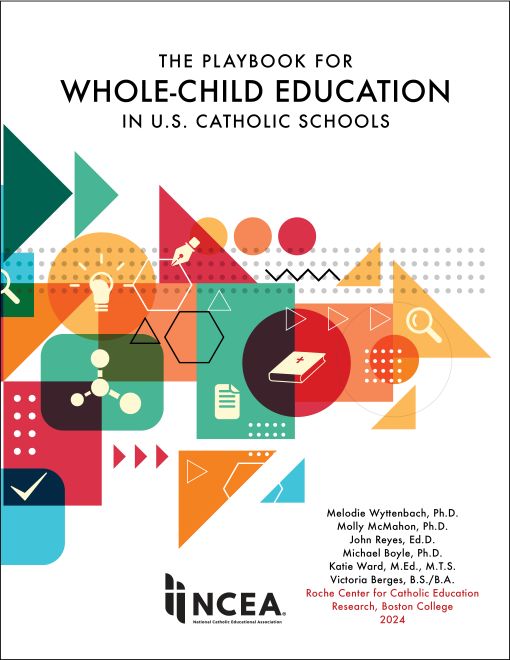...investing in what students, educators and families all need most: to know God through prayer and through one another.
Written by Molly McMahon, director of leadership programs, Barbara and Patrick Roche Center for Catholic Education, mcmahomw@bc.edu
As the number of people entering religious life in the United States dwindles, so does the number of religious in Catholic schools, leaving Catholic school leadership and staff undersupported in the area of faith formation. Because of this reality, many Catholic schools struggle to initiate spiritual curriculum and programming throughout their schools. Spending time with God, more often than not, turns into a checkbox to tick rather than a truly meaningful encounter with the Divine. Are students in Mass? Check. Are they receiving their Sacraments of Initiation? Check. But spirituality is so much more than a checkbox—it is an experience meant to flow throughout a person’s life, seamlessly.
Truly catechizing students is giving them the tools to sense God in themselves, their community and the world around them—not merely in church or in religion class. God is everywhere! In The Playbook for Whole-Child Education in U.S. Catholic Schools, we showcase a 12 parish school network in Greater Milwaukee that is making students aware of just that—the Seton Family Catholic schools are investing in the spirituality of Catholic leaders, teachers, students and their families as an integral aspect of Whole-Child Education rather than letting spiritual formation fall to the wayside along with the decline in religious vocations. Below, we share three key areas in which Seton schools are homing in to improve the spirituality of their school communities. We encourage you to check out The Playbook for Whole-Child Education in U.S. Catholic Schools to learn more about spiritual practices for the whole child. In this blog, we hope to shed light on how the Seton schools provide an exemplary model for Catholic schools by investing in what students, educators and families all need most: to know God through prayer and through one another.
1. Catechizing Leaders and Teachers
We, as Catholic school educators, must foster our own spirituality before teaching others. Recognizing this, the Seton Family Catholic schools created the Spark program, which appoints a Spark teacher with a strong, theological background to “spark” the faith development of the entire school community. The Spark teacher does this by working closely with school leadership on professional development sessions, faith programming throughout the school, and Spark program objectives to stay on target with continued evaluation and expansion of the program. Consistency through regularly scheduled meetings and check-ins are vital to the overall spiritual maturation of the school community. These meetings convey that spirituality is not a side component to Catholic education; it is the priority. Thus, it is crucial that clear expectations, objectives, and metrics are set up to see progress in the spiritual development of students, similar to their intellectual development.
2. Accompanying Families
Seton schools also recognize that parents are the primary educators of their children, thus a spiritually conscious program must include the whole family. School-based family engagement coordinators exhibit the Ignatian value of accompaniment by meeting families where they are in their needs, cultural norms and faith backgrounds. Seton schools encourage spiritual practices such as seeing God in our daily lives, which transcend any one particular faith background. In the true spirit of celebrating diversity, Seton schools also make it a priority to collaborate with non-Catholic churches that serve their students and families. For parents who want to be more involved in the Catholic faith, adult faith formation and opportunities to participate in liturgy are offered. Thus, Seton schools make themselves not only responsible for the spiritual development of their students, but the whole family as well.
3. Caring for the Whole Community: Cura Communitas
While all of us have an individual relationship with God, we experience the Divine more fully when we engage in faith practices as a community. When we come together to worship, the faith of others acts as a witness that God is present and felt, not just in ourselves but in those around us. Thus, having structured time for school communities to come together, to learn about God and share their experiences with each other, helps to foster everyone’s relationship with God. The Seton schools allow each school community to determine what faith-based practices work best for their unique student population. In doing so, the Seton schools emphasize that all of our relationships with God and with each other are truly unrepeatable. According to the Ignatian value of cura communitas, which means “care for the whole, unique community,” we must then tend to these relationships based on the unique persons which compose a community and the unique school contexts. Thus, allowing Seton schools the freedom to choose their own method of engaging spiritually with one another helps to best foster the spirituality of each unique faith community. For example, one Seton school utilizes a common system of faith sharing they call “faith houses.” Children across grades are separated into groups or houses, which meet daily for 20 minutes. Such houses create a common home for students in which they feel they can reflect more deeply with their peers across ages about their relationship with God. Activities include engaging in scripture, learning about a saint, recognizing one another for exhibiting the values of Christ and more. Therefore, it is important to build structured and regularly practiced faith activities as a unique school community.
To conclude, we must prioritize the spiritual development of our Catholic school communities because God is the Fount of Life, from which all other progress and development flows. The intellect is always something that can be improved upon, but without a strong, moral foundation, built upon personal and interpersonal encounters with God, that intellect has no ground on which to stand. Spirituality is not just a checkbox but a strong moral foundation and sense of integrity that our children become whole individuals. Let’s honor what makes Catholic school education truly the most spectacular by investing in the spirituality of our students. After all, if we lead someone to God then we have given them the best tools to build a better world. Please visit the NCEA Store to learn more about how to guide students and the entire school community to an encounter with the living God.
Want More?
Join us for an Author’s Corner webinar series with the authors of The Playbook for Whole-Child Education in U.S. Catholic Schools:
- Nurturing the Soul: Cultivating Spiritual Growth in Catholic Schools – March 18, 2025, 4:00 PM ET
- Enhancing Student Flourishing: Integrating Cognitive, Social, and Emotional Well-Being in Catholic Education – March 25, 2025, 4:00 PM ET
- Supporting the Whole Child: Understanding the Impact of Ecosystems and Physical Well-Being on Student Development – April 8, 2025, 4:00 PM ET












